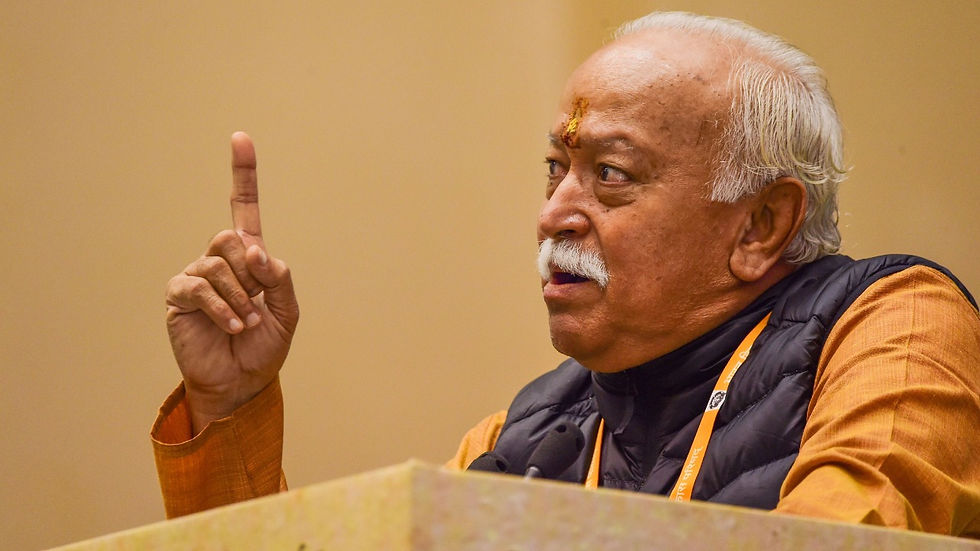Hindu Fascists concoct History to serve the Upper-Caste Hegemony
- Aslam Abdullah
- Jun 4, 2022
- 3 min read
Updated: Aug 3, 2025
He is Mohan Bhagwat, the chief of the Hindu fascist organization, RSS, which believes in the supremacy of upper castes because the deity carved of stones and mired in mythology told him so.

The chief of the Hindu fascist organization, Mohan Bhagwat, would not want his party workers to look for Shivling in every mosque in India. Instead, he would prefer to endorse the presence of Shiva's Phallus in the Shahi Masjid located in Gayan Vapi locality of Varanasi, a city situated on the banks of the Ganges, a river revered by Hindus.
He backed his claim based on his narrative of the history of Islam in India. In his view, Islam came to India with Muslim invaders, who destroyed Hindu places of worship to demoralize Hindus. When Bhagwat refers to Hindus, he means twice-born or Brahmans, the upper caste who were the sole owners of temples. The so-called lower castes were never part of the upper caste religious structure.
Bhagwat's statement exposes his one-sided view of history, devoid of historical facts. Some of them were as follows.
The Afghans, Iranians, Turks, or Arab armies did not introduce Islam to India. Instead, they came to India at the invitation of Hindu rulers, who wanted their fighting skills to subdue their Hindu rivals.
Traders and merchants introduced Islam to the people of India. Long before the arrival of foreign armies, people in certain parts of India were knowledgeable of Islam.
Monotheism was the call of earlier settlers in India. But over time, the upper castes changed it into polytheism to serve their religious and financial interests.
The foreign armies destroyed many institutions they considered hostile to their military expeditions, with the connivance of their local Hindu supporters. The destruction of places of worship was part of political and military activities and not a religious mandate.
Many local communities admired Islam's simplicity, and many of them renounced their previous religion to accept Islam. In places where an overwhelming majority of the local population accepted Islam, the older houses of worship got replaced with mosques. Using some stones part of previous Hindu temples in mosques indicates this voluntary transition.
The conversion was voluntary and peaceful. Initial conversion came from the marginalized Hindu communities, impressed with Islam's egalitarian values and simplicity.
Many present-day Muslims come from an ancestry that traces its roots to either the four main castes or untouchables.
The rejection of Hinduism was conscious with no regrets. On the contrary, it was the best decision majority of Muslims in India credit their forefathers.
They rejected polytheism, as they realized that deities carved of stones could not benefit or harm anyone.
They also rejected believing in mythology that promotes the worship of private parts of deities.
Bhagwat's statement goes against all these historical facts. On the contrary, his purpose is to glorify the Hindu upper-caste domination. He and his supremacist party are nostalgic about a past where the so-called lower castes served others in a state of perpetual slavery. His occasional reference to the Codes of Manusmirti as India's constitution speaks of his dream kingdom that he calls Ram Rajya.
He might have incited his followers through his senseless statements, but he has exposed Hinduism's inherent weaknesses. First, in the world we live in today, no one would seriously accept the stratification of human society by birth as a means to determine people's social status. Secondly, polytheism would not be able to sustain itself in a rational and scientific world that realizes that that stone, however beautifully carved, would always remain stone devoid of any life.



Comments